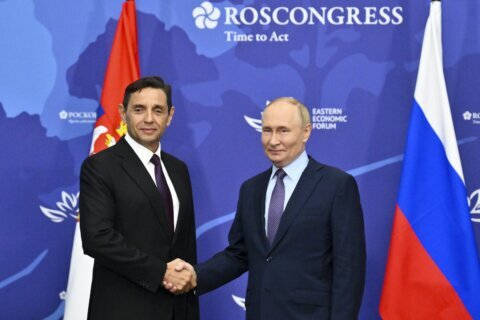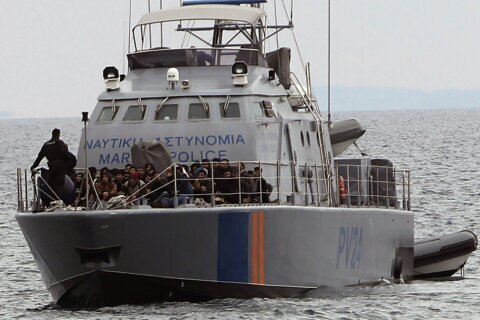BRUSSELS (AP) — The European Union’s top migration official expressed concern on Wednesday about a Hungarian work visa program open to citizens from Russia and Belarus, just as sabotage attacks and spying allegations raise alarm across Europe.
Hungary extended its National Card program to citizens from Russia and Belarus as it took over the EU’s rotating presidency in July. It happened as Prime Minister Viktor Orbán traveled to Moscow for talks with Russian President Vladimir Putin, a trip slammed by his EU counterparts.
The card also allows easier entry into Europe’s ID-check free zone for work purposes to citizens from Bosnia, Moldova, Montenegro, North Macedonia, Serbia and Ukraine. All six countries are candidates to join the EU. Russia and Belarus are not.
“It’s a bit strange to actually welcome specifically citizens from Russia and Belarus in a situation where we know that these countries are hostile to the European Union,” European Home Affairs Commissioner Ylva Johansson told EU lawmakers.
The Hungarian prime minister, widely seen as having the warmest relations with Putin among EU leaders, has routinely blocked, delayed or watered down EU efforts to assist Kyiv and impose sanctions on Moscow for its actions in Ukraine.
Belarus is Russia’s main ally and has served as a rear base for Russian troops.
Johansson listed a series of incidents since Russia’s full-fledged invasion of Ukraine in February 2022, including sabotage or hacking attacks in the Czech Republic, Estonia, Lithuania and Poland. She also noted possible threats to military bases in Germany.
“This is a time for more vigilance, not less. This is not a time to be soft on security,” she said, adding that safe travel within the passport-free zone linking 29 countries, most of them EU nations, could be undermined. “We must keep each other safe.”
Early last month, Johansson sent a letter to Hungary seeking clarification about its National Card, notably whether the program imposes stricter security checks on Russian and Belarus nationals. She received a reply two weeks ago but on Tuesday wanted to know more.
Johansson asked: “Why does the Hungarian government consider such a scheme necessary or appropriate in the current political situation? The expected national economic gains seem limited (and) disproportionate to the potential security impact.”
At a news conference in Brussels, Hungarian EU Affairs Minister Janos Boka played down the commission’s concerns. He said that seven countries, including Germany, Latvia, Poland and Spain have issued more visas to Russians.
“In the past two months, 10 permits were issued for Russian citizens and four permits were issued for Belarus from citizens. This is not an increasing trend, and these numbers are statistically irrelevant,” Boka told reporters. Johansson said the number of visas issued to Russians have dropped by almost 90%.
Boka insisted that for Hungary “there is no legal and security issue whatsoever when it comes to the National Card.” Hungarian officials complained that he had not been invited to the European Parliament to address Johansson’s questions in person.
The parliament’s press service said Hungary had not expressed a wish to attend.
Copyright © 2024 The Associated Press. All rights reserved. This material may not be published, broadcast, written or redistributed.







